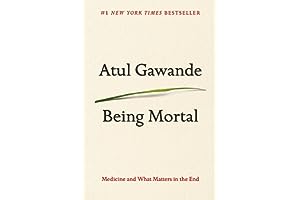One sentence summary
Atul Gawande’s Being Mortal: Medicine and What Matters in the End explores how to remain focused in the path of life, and how to make the most of what makes us human even at its end.
Book genre
Scientific Non-Fiction
Main topic of the book
The book is about how to reconcile aging, mortality, and quality of life.
Key Ideas
- Death is inevitable, and what we can do to make our lives meaningful in light of the fact.
- Aging and mortality are normal and natural parts of life, and decisions about life should be informed by this.
- Healthcare needs to be put into the context of wellbeing and making the most of life.
- Supportive friendships can help in coping with the losses associated with aging and mortality.
- Palliative care should be an option for people facing mortality.
Main parts of the book and a short summary
Part I of Being Mortal focuses on how we can benefit from challenging conversations about mortality, waning physical and mental faculties, and the need for understanding quality of life. It is a discussion on how we view death, and our need to make informed decisions about end of life care.
Part II showns how medical professional deal with end of life decisions, and initiatives to use palliative care services instead of aggressive treatments to extend life.
Part III speaks about the importance of supportive friendships and how they impact mortality and aging. It also speaks about how the medical profession could shift to provide an understanding of what matters to a person’s life.
Part IV speaks about how Gawande himself contributes to this understanding and what he intends to do as a result of this. He speaks about the medical reforms needed to provide people with the best possible options in the last stages of life.
Key takeaways
- Death is natural, and it is possible to make the most of life despite its inevitability.
- Palliative care should be an accessible and accepted option for those in their last stages of life.
- Use respectful and understanding conversations about mortality and end of life decisions to improve quality of life.
- Supportive relationships and friendships are essential for coping with the losses that come with aging, and mortality.
- Medical reforms are needed to best serve people in their last stages of life.
Author’s background and qualifications
Atul Gawande is a surgeon, professor at Harvard Medical School, and staff writer for The New Yorker. He is the recipient of the MacArthur Fellowship, an award given to individuals who exemplify “extraordinary originality and dedication in their creative pursuits, and a marked capacity for self-direction”.
Target audience
The book is intended for anyone who has faced difficult experiences related to mortality or aging and those who are curious about the medical profession’s view on them.
Publisher and first publication date
It was first published in the United States in 2014 by Metropolitan Books, an imprint of Macmillan Publishers.

